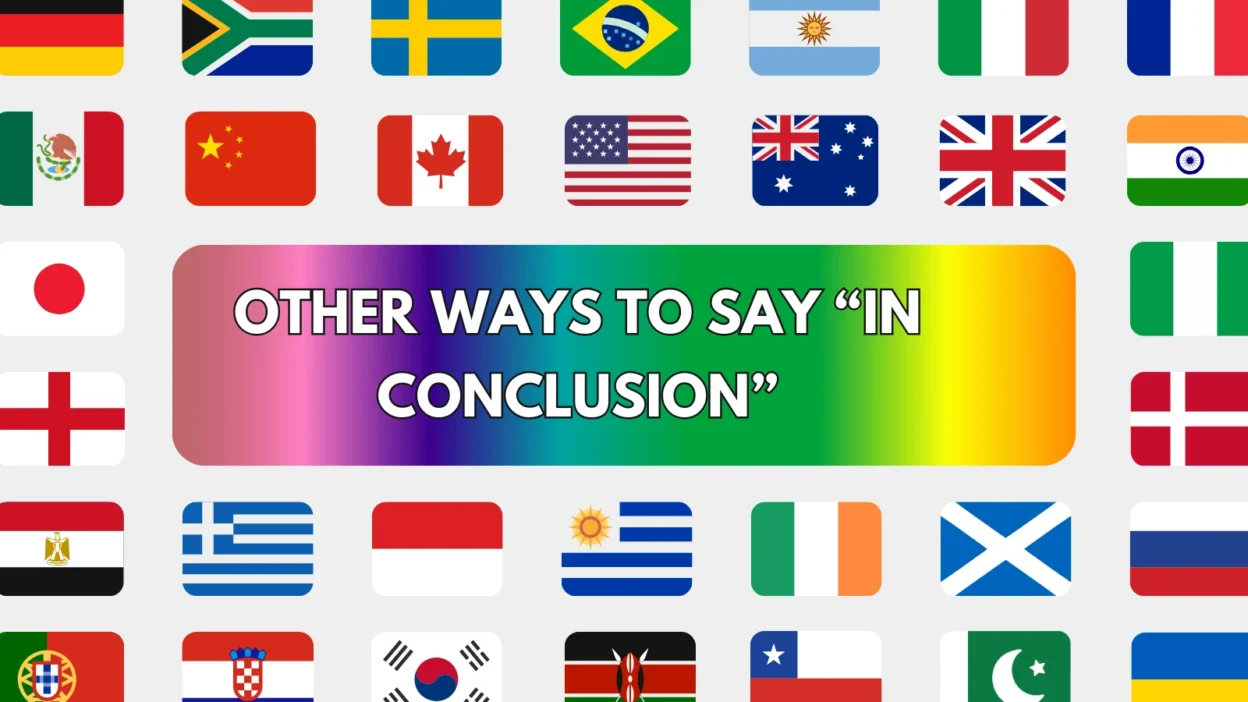“In conclusion” is a classic phrase often used to signal the end of an essay or to introduce the final thoughts. While it’s functional and clear, relying on it too much—or using it repeatedly—can make your writing sound formulaic. Expanding your vocabulary with other expressions keeps your writing fresh, polished, and engaging, especially in academic or formal contexts.
Below are 25 alternatives to “in conclusion”, each explained with meaning, detailed explanation, a usage example, best context, and tone.
1. To Sum Up
Meaning
Used to briefly restate key points.
Detailed Explanation
A simple, clear phrase often used to begin final thoughts or overviews.
Scenario Example
To sum up, renewable energy offers a practical and sustainable future.
Best Use
Essays, presentations, summaries.
Tone
Neutral, concise.
2. To Conclude
Meaning
Formally signals the end of a piece of writing or speech.
Detailed Explanation
Slightly more formal than “to sum up,” and perfect for academic or structured writing.
Scenario Example
To conclude, education remains the strongest tool for social change.
Best Use
Academic papers, essays.
Tone
Formal, professional.
3. In Summary
Meaning
Indicates a brief recap or overview of the main points.
Detailed Explanation
Helps transition smoothly into a final wrap-up without sounding repetitive.
Scenario Example
In summary, both economic growth and environmental care must go hand in hand.
Best Use
Essays, reports, debates.
Tone
Clear, informative.
4. Overall
Meaning
Expresses a final assessment or overall viewpoint.
Detailed Explanation
Best used to wrap up ideas by presenting the larger picture.
Scenario Example
Overall, the benefits of vaccination far outweigh the risks.
Best Use
Analysis, argumentative essays.
Tone
Balanced, reflective.
5. All Things Considered
Meaning
Summarizes while taking all points into account.
Detailed Explanation
Shows depth in reflection, making it suitable for critical writing.
Scenario Example
All things considered, remote work has proven to be both efficient and adaptable.
Best Use
Reflective essays, opinion pieces.
Tone
Thoughtful, mature.
6. As a Final Point
Meaning
Introduces the last point or idea before closing.
Detailed Explanation
Used to indicate one final idea or message before concluding completely.
Scenario Example
As a final point, it’s important to remember the role of empathy in leadership.
Best Use
Persuasive writing, formal essays.
Tone
Emphatic, concluding.
7. Finally
Meaning
Signals the last statement or part of your argument.
Detailed Explanation
Simple and effective, but should be used only once to avoid confusion with sequencing.
Scenario Example
Finally, recycling should become a universal practice for all households.
Best Use
Any structured writing or speech.
Tone
Neutral, structured.
8. Ultimately
Meaning
Indicates the most important or decisive conclusion.
Detailed Explanation
Best used to express a final judgment or overarching insight.
Scenario Example
Ultimately, it is compassion that defines humanity’s true progress.
Best Use
Philosophical, persuasive essays.
Tone
Reflective, powerful.
9. As Has Been Shown
Meaning
Refers back to evidence or analysis provided.
Detailed Explanation
Adds a scholarly tone by grounding conclusions in the body of the essay.
Scenario Example
As has been shown, climate policy must include both innovation and regulation.
Best Use
Research papers, formal writing.
Tone
Academic, logical.
10. In Closing
Meaning
Signals that the essay or speech is coming to an end.
Detailed Explanation
Professional yet warm; suitable for both written and spoken contexts.
Scenario Example
In closing, we must act now to preserve natural resources for future generations.
Best Use
Presentations, formal reports.
Tone
Polished, respectful.
11. Taking Everything Into Account
Meaning
Summarizes with full consideration of discussed elements.
Detailed Explanation
Indicates a balanced and fair final opinion.
Scenario Example
Taking everything into account, stricter traffic laws would reduce accidents.
Best Use
Opinion essays, argumentative writing.
Tone
Comprehensive, fair.
12. To Wrap Up
Meaning
A casual alternative to conclude your main ideas.
Detailed Explanation
Best used in friendly or less formal writing styles.
Scenario Example
To wrap up, exercise brings both physical and mental health benefits.
Best Use
Blog posts, informal essays.
Tone
Friendly, clear.
13. As Demonstrated Above
Meaning
Refers to previously stated evidence or reasoning.
Detailed Explanation
Shows connection and reinforces arguments made earlier.
Scenario Example
As demonstrated above, digital literacy is essential in today’s education.
Best Use
Reports, academic writing.
Tone
Precise, scholarly.
14. In Light of the Above
Meaning
Draws a conclusion based on earlier discussion.
Detailed Explanation
Adds logic and analytical depth to your final statement.
Scenario Example
In light of the above, stricter regulations on advertising are necessary.
Best Use
Debate, analysis, persuasive writing.
Tone
Critical, formal.
15. With That in Mind
Meaning
Brings the essay to a close while considering key points.
Detailed Explanation
Encourages the reader to reflect on the content presented.
Scenario Example
With that in mind, mindfulness should be included in school curricula.
Best Use
Opinion essays, reflective writing.
Tone
Thoughtful, insightful.
16. To Bring Everything Together
Meaning
Synthesizes main ideas into a unified summary.
Detailed Explanation
Helps show how different points connect to form a larger picture.
Scenario Example
To bring everything together, strong leadership is rooted in empathy, strategy, and trust.
Best Use
Synthesis paragraphs, thematic essays.
Tone
Comprehensive, summarizing.
17. Looking Back
Meaning
Reflects on the discussion from a retrospective perspective.
Detailed Explanation
Adds a reflective tone, often ideal for personal or narrative essays.
Scenario Example
Looking back, it’s clear that those early experiences shaped my career path.
Best Use
Personal writing, storytelling.
Tone
Reflective, personal.
18. This Confirms That
Meaning
Draws a strong conclusion based on proof or logic.
Detailed Explanation
Effective for argumentative and research-based essays.
Scenario Example
This confirms that access to early education leads to long-term societal benefits.
Best Use
Evidence-based essays, formal writing.
Tone
Assertive, logical.
19. In Essence
Meaning
Boils down a larger point to its core idea.
Detailed Explanation
Adds a philosophical or thoughtful tone to the summary.
Scenario Example
In essence, equality isn’t just a right—it’s a necessity for peace.
Best Use
Persuasive, reflective writing.
Tone
Intellectual, condensed.
20. From This, It Is Clear That
Meaning
Draws a clear conclusion based on discussion.
Detailed Explanation
Guides the reader toward a logical endpoint.
Scenario Example
From this, it is clear that renewable energy is our most viable solution.
Best Use
Academic, persuasive writing.
Tone
Logical, structured.
21. Thus
Meaning
Indicates a logical result or conclusion.
Detailed Explanation
Short and effective, often used in more formal or technical writing.
Scenario Example
Thus, stricter environmental laws are essential for long-term survival.
Best Use
Formal essays, reports, science papers.
Tone
Professional, to-the-point.
22. Therefore
Meaning
Leads directly into a final conclusion based on evidence or logic.
Detailed Explanation
Perfect for analytical or critical writing styles.
Scenario Example
Therefore, the current economic policy must be revised.
Best Use
Argumentative or analytical writing.
Tone
Firm, logical.
23. To Finalize
Meaning
Brings the discussion or writing to an official end.
Detailed Explanation
Slightly formal, and helpful when organizing final sections or proposals.
Scenario Example
To finalize, let’s commit to real change through collective action.
Best Use
Business writing, speeches.
Tone
Conclusive, structured.
24. My Final Thoughts Are
Meaning
Introduces your personal final opinion or reflection.
Detailed Explanation
Best for first-person essays or articles with personal voice.
Scenario Example
My final thoughts are that change begins with small, consistent actions.
Best Use
Opinion pieces, blog posts.
Tone
Personal, direct.
25. In Retrospect
Meaning
Reflecting back to form a final opinion.
Detailed Explanation
Adds depth and introspection to your conclusion.
Scenario Example
In retrospect, those small challenges led to great growth.
Best Use
Narrative essays, personal reflections.
Tone
Reflective, insightful.
Conclusion
While “in conclusion” is a classic signpost for wrapping up an essay, using diverse and thoughtful alternatives can make your writing more engaging, intelligent, and polished. Whether you’re aiming for a formal tone, emotional resonance, or logical precision, these 25 options help you finish strong and leave a lasting impression.

Hadi Bhatti is a passionate writer and content creator at Saypadia, known for turning complex words, phrases, and internet slang into simple, easy-to-understand explanations. With a strong interest in language, meanings, and digital communication, Hadi focuses on helping readers understand what words really mean in everyday use. His writing style is clear, engaging, and user-focused, making learning both practical and enjoyable.




